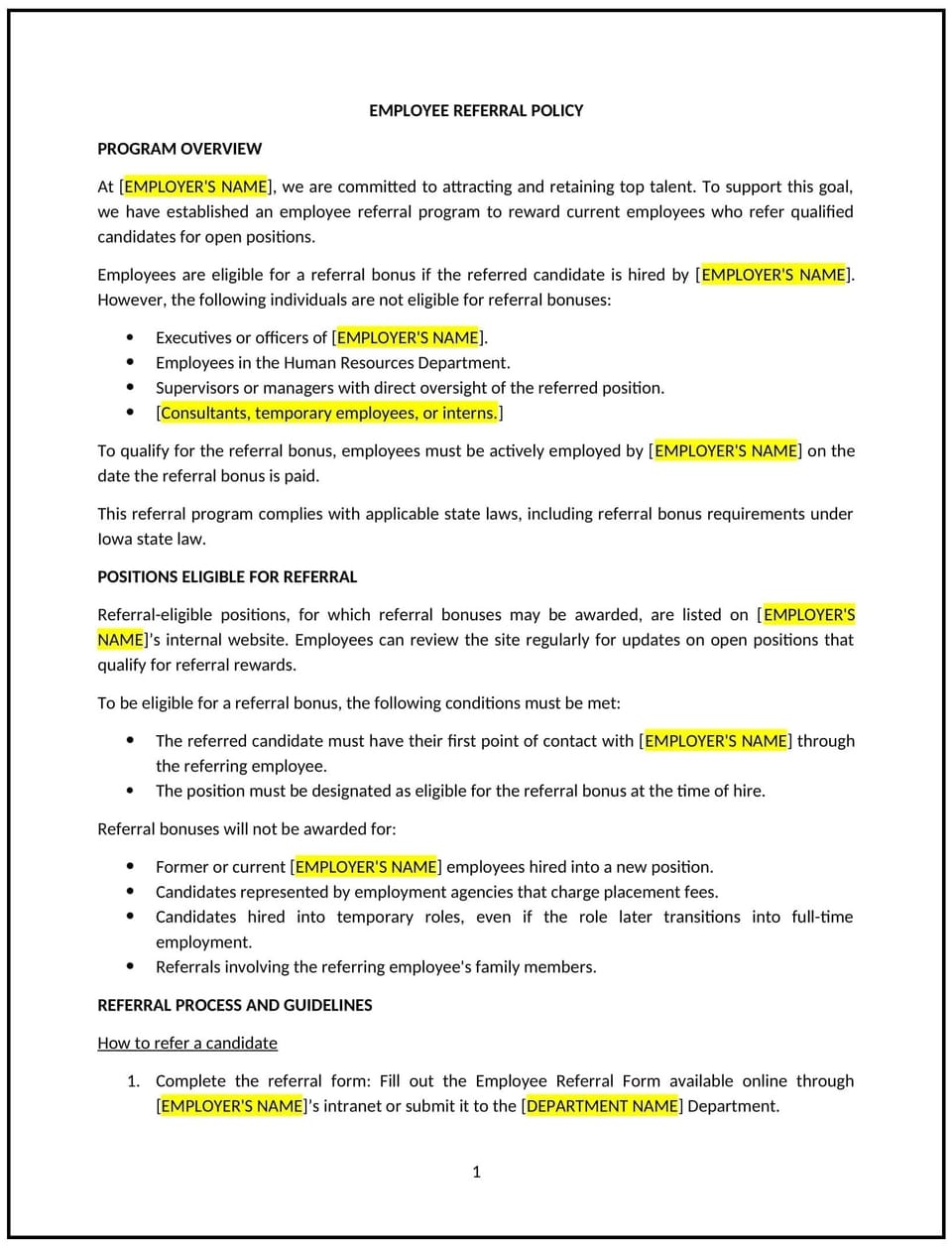Employee referral policy (Iowa): Free template

Employee referral policy (Iowa)
An employee referral policy helps Iowa businesses attract qualified candidates by encouraging current employees to recommend individuals for open positions. Referral programs can improve hiring efficiency, reduce recruitment costs, and bring in candidates who align with company culture.
This policy outlines referral procedures, eligibility criteria, and potential incentives for successful hires. It provides businesses with a structured approach to leveraging employee networks for talent acquisition while maintaining fair hiring practices.
By implementing this policy, businesses in Iowa can enhance recruitment efforts, improve retention rates, and build a stronger workforce through employee recommendations.
How to use this employee referral policy (Iowa)
- Define referral eligibility: Specify which employees can participate in the referral program and any restrictions for leadership or HR personnel.
- Outline the referral process: Provide steps for submitting referrals, including required forms, contact details, and job-specific information.
- Establish incentive guidelines: Clarify whether referrals qualify for bonuses, gift cards, or other rewards and the conditions for payout.
- Set hiring criteria: Ensure referrals meet job qualifications and hiring standards before consideration.
- Address referral limits: Define how many referrals an employee can submit and whether multiple bonuses can be earned.
- Prevent conflicts of interest: Restrict referrals between direct family members or employees involved in the hiring process.
- Communicate program updates: Inform employees about any changes to referral policies or reward structures.
- Review and update: Regularly assess the effectiveness of the referral program and make adjustments as needed.
Benefits of using this employee referral policy (Iowa)
This policy offers several advantages for Iowa businesses:
- Speeds up hiring: Reduces the time needed to find and hire qualified candidates.
- Improves candidate quality: Leverages employee networks to attract candidates who fit the company culture.
- Reduces recruitment costs: Lowers spending on job postings, external recruiters, and hiring agencies.
- Increases employee engagement: Encourages employees to participate in shaping the workforce.
- Enhances retention rates: Referred employees tend to stay longer due to pre-existing workplace connections.
- Streamlines hiring processes: Provides a structured approach to managing referrals and incentives.
Tips for using this employee referral policy (Iowa)
- Promote the program regularly: Businesses should remind employees about referral opportunities through meetings, emails, and company portals.
- Offer meaningful incentives: Businesses should provide rewards that motivate employees to refer qualified candidates.
- Ensure fair evaluation: Businesses should assess referred candidates based on qualifications, not just personal connections.
- Track program success: Businesses should review hiring data to measure the impact of referrals on recruitment.
- Provide timely feedback: Businesses should update employees on the status of their referrals and expected timelines.
- Adjust incentives as needed: Businesses should modify reward structures to maintain employee interest in the program.
Q: Why should Iowa businesses implement an employee referral policy?
A: Businesses should use this policy to attract qualified candidates, reduce hiring costs, and enhance employee engagement in recruitment efforts.
Q: What types of incentives should businesses offer for referrals?
A: Businesses should provide cash bonuses, extra paid time off, gift cards, or other meaningful rewards for successful referrals.
Q: Who is eligible to participate in the referral program?
A: Businesses should allow most employees to submit referrals, except those in HR or hiring roles to avoid conflicts of interest.
Q: How should businesses evaluate referred candidates?
A: Businesses should assess referrals based on job qualifications, experience, and cultural fit before making hiring decisions.
Q: When do employees receive referral bonuses?
A: Businesses should specify when incentives are paid, such as after the new hire completes a probationary period.
Q: Can employees refer friends or family members?
A: Businesses should define whether referrals of close relatives are allowed and set guidelines to prevent favoritism.
Q: How often should businesses review their referral policy?
A: Businesses should update the policy periodically to reflect hiring needs and adjust incentives as necessary.
Q: What happens if multiple employees refer the same candidate?
A: Businesses should establish a first-come, first-served policy or split the referral bonus if multiple employees recommend the same individual.
This article contains general legal information and does not contain legal advice. Cobrief is not a law firm or a substitute for an attorney or law firm. The law is complex and changes often. For legal advice, please ask a lawyer.


